English CBSE Class 11 NCERT Hornbill Chapter 8 Silk Road Extra Questions and Answers – Extract Based Questions Short Answer Questions Long Answer Questions and Value Based Questions
SILK ROAD – Extra Questions
Extract Based Questions
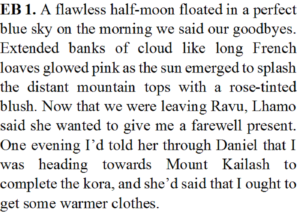

(i) Where was author going to?
(a) Ravu
(b) Lhamo
(c) Mount Kailash
(d) None of the above
(ii) Which figure of speech has been used in the phrase ‘banks of cloud like long French loaves’
(a) Metaphor
(b) Alliteration
(c) Oxymoron
(d) Simile
(iii) Which of the following objects could be seen in the sky on that day
- Moon
- Sun
- Bread
- Trees
- Clouds
- Mountains
(a) 1, 2 and 3
(b) 1,2 ,5 and 6
(c) 2,5 and 6
(d) 2,3 and 6
(iv) Who wanted to give a farewell gift to the author?
(a) Daniel
(b) Lhamo
(c) Ravu
(d) Moon
(v) Based on above extract classify following as facts or opinion.
- Author was going to Mount Kailsah to complete kora
- Author did not have any warm clothes
- I can assume that Lhamo did not understand any word of author
- Mountains must have been capped with snow
- Moon and Sun both were visible in the sky
- Daniel was the translator for the author
(a) F – 1,5, 6 and O- 2, 3 ,4
(b) F – 1,2, 4, and O – 3, 5
(c) F – 1,4,5 and O – 2,3
(d) F – 4, 5 and O -1,2,3
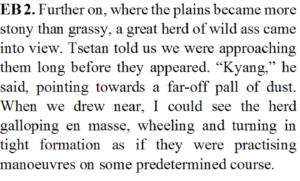

(i) By what name wild ass has been called in the extract?
(a) stony
(b) kyang
(c) pall
(d) herd
(e) wheeling
(ii) What do you infer from the phrase ‘plains became more stony than grassy’.
(a) The terrain now had less greenery
(b) The terrain had become hilly
(c) The terrain had many stone rocks along the way
(d) All the above
(iii) The expression ‘more stony than grassy’ has been used in the extract. Which of the following expression is not similar to it?
(a) more rosy than gloomy
(b) more bright than dull
(c) more reddish than greenish
(d) more apples than oranges
(iv) Which of the following word as used in the extract does not indicate a type of movement.
(a) galloping
(b) manoeuvres
(c) pointing
(d) turning
(v) Tsetan could have been any of the following except
(a) guide of the author
(b) driver of the author
(c) translator of the author
(d) kyang of the author
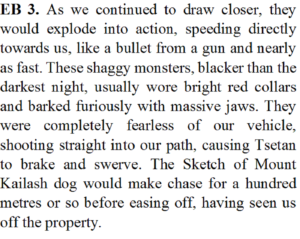

(i) Speed of the dog has been compared with
(a) gun
(b) vehicle
(c) bullet
(d) chase
(ii) Which of the following can be conclusively inferred about Mount Kailsh dogs
- their colour is black
- they are very quick
- they are tiny creatures
- they have massive jaws
- they usually wear yellow collars
(a) 1, 2 and 3
(b) 1,2 and 4
(c) 2,3 and 5
(d) 1,3 and 5
(iii) Which of the following action was not done by the dogs
(a) they ran towards the vehicle
(b) they ran into the path of the vehicle
(c) they swerved the vehicle
(d) they barked furiously
(iv) For what distance a Mount Kailash dog is likely to chase a vehicle
(a) 100 meters
(b) more than 100 meters
(c) less than 100 meters
(d) about 100 meters
(v) The expression ‘to draw closer’ has been used in the extract. Which of the following expression cannot be used with ‘to draw’?
(a) to draw nearer
(b) to draw painting
(c) to draw vocal
(d) to draw further
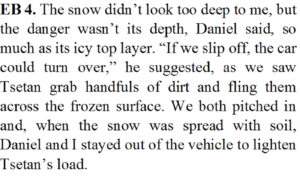

(i) What according to extract is not a danger with snow?
(a) its icy top layer
(b) its depth
(c) possibility of slip off
(d) none of the above
(ii) Who among the following was driving the car
(a) the author
(b) Daniel
(c) Tsetan
(d) none of the above
(iii) What was done to negotiate the snow laden part of the road?
(a) soil was spread on the snow
(b) author and Daniel got down from the vehicle
(c) both (a) and (b)
(d) none of the above
(iv) Who among the following threw dirt and soil on the snow?
(a) Daniel
(b) Author
(c) Tsetan
(d) All the above
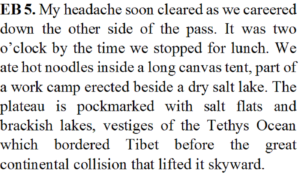

(i) Which word in the extract mean ‘moved quickly’
(a) careered
(b) stopped
(c) erected
(d) lifted
(ii) What did they have for their lunch?
(a) salt flats
(b) noodles
(c) continental food
(d) Chinese food
(iii) Which of the following is not true about the place where they took lunch?
(a) a canvas tent
(b) work camp
(c) by the side of a dry salt lake
(d) none of the above
(iv) What features can be observed about the plateau?
(a) salt flats
(b) brackish lakes
(c) vestiges of the Tethys Ocean
(d) All the above
(v) According to the extract why the headache of author cleared?
(a) he ate his lunch
(b) he had travelled to lower altitude
(c) because of salt flats
(d) because of continental collision
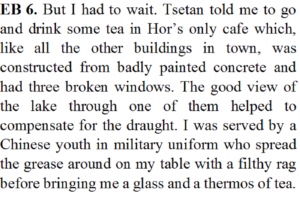

(i) Which of the following is not true about the café at Hor?
(a) it was the only café in the town
(b) it was constructed from badly painted concrete
(c) it had three broken windows
(d) it had two doors
(ii) What did the author have at the café?
(a) coffee
(b) lunch
(c) tea
(d) snacks
(iii) What compensated the poor look of café?
(a) good taste of tea
(b) good seating arrangement
(c) good view of lake through the window
(d) uniform of the waiter
(iv) Which of the following is true with respect to the café and the service
- the waiter was a Chinese
- the waiter was wearing white uniform
- the waiter cleaned the table with a dirty cloth
- the waiter brought two glasses
- the waiter brought one thermos
- the waiter brought one glass
- taste of tea was good
(a) 1,2, 4 and 6
(b) 1, 3,5 and 6
(c) 4,5,6 and 3
(d) 5 and 4
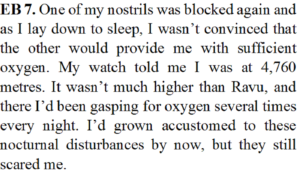

(i) What was indicated in the watch author was using?
(a) time in hours
(b) time in minutes
(c) time in hours and minutes
(d) altitude in meters
(ii) The author had not got used to which of the following
(a) lack of oxygen
(b) gasping for oxygen
(c) nocturnal disturbances
(d) sound sleep during the day
(iii) What does the word ‘other’ refer to in ‘I wasn’t convinced that the other would provide me…’
(a) the window
(b) the blocked nostril
(c) the unblocked nostril
(d) the watch
(iii) Based on above extract classify following as facts or opinion.
- The blockage in the nostril had occurred earlier as well
- Probably the same nostril was getting blocked again and again
- The altitude of the place was 4760 meters
- Altitude of Ravu was slightly less than that of this place
- I believe authors had not become used to breathlessness
- Author was scared of breathing trouble
(a) F – 1,5, 6 and O- 2, 3 ,4
(b) F – 1,3,4,6 and O – 2, 5
(c) F – 1,4,5 and O – 2,3
(d) F – 4, 5 and O -1,2,3
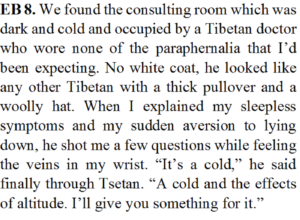

(i) Which of the following is not true about the consulting room?
(a) it was dark
(b) it was cold in the room
(c) a Tibetan doctor was in the room
(d) the room was airy
(ii) Before giving medicines to author, the doctor
- asked some questions
- took an X ray
- checked vein of the author
- declared that it was due to cold
- advised some blood tests
- said that it was because of altitude
(a) 2, 5 and 6
(b) 1, 3,4 and 6
(c) 3, 4 and 6
(d) 2, 4 and 6
(iii) Which of the following is true about the doctor
- he was wearing a white coat
- he was a Tibetan
- he was wearing a woolly hat
- he could speak English
- he was wearing a thick pullover
(a) 1,4 and 5
(b) 3,5 and 6
(c) 1,2 and 5
(d) 2,3 and 5
(iv) About which ailments the author explained to the doctor?
(a) sleeplessness
(b) aversion to lying down
(c) both (a) and (b)
(d) none of the above
(v) Why did the doctor spoke through Tsetan?
- he was a friend of Tsetan
- Tsetan and the doctor both new a common language
- author was not in talking terms with doctor
- the doctor did not know the language the author spoke
- the doctor was a shy person
- the author was deaf
(a) 2 and 4
(b) 1 and 5
(c) 3 and 6
(d) 5 and 6
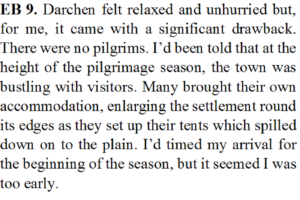

(i) What was a drawback of Darchen?
(a) it was not lively
(b) it had less population
(c) there were no pilgrims
(d) it was a small town
(ii) Which of the following happens at Darchen during tourist season?
- town bustles with visitors
- many visitors bring their own accommodation
- visitors spoil the ecological balance of the town
- area of the town gets increased
- tents of visitors extend upto down the plains
- the town becomes very dirty
(a) 1,2,3 and 4
(b) 2,3,4 and 6
(c) 1,2,4 and 5
(d) 2,3,4 and 5
(iii) Based on the extract please classify following as facts and opinion
- Darchen was a relaxed town
- I feel the author had come a bit too early to the town
- I believe coming early has many advantages
- He should have come a bit later
- Presently the town did not have any pilgrim except the author
(a) F- 1, 2,5 and O- 3,4
(b) F – 1, 3,4 and O – 2,5
(c) F – 2,5 and O – 1,3,4
(d) F – 1,5 and O – 2,3,4
(iv) The extract has an expression ‘I’d timed my arrival’. Which of the following cannot be a correct use of ‘I had timed’
(a) I had timed my journey
(b) I had timed my birth
(c) I had timed my departure
(d) I had timed my exercise
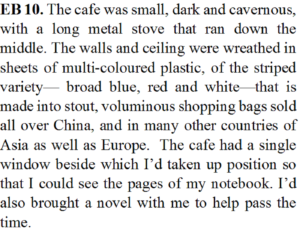

(i) According to above extract, which of the following activities author used to do at the café?
(a) have food
(b) write in his notebook
(c) read novel
(d) all the above
(ii) According to extract, the huge plastic bags are not sold in which of the following region
(a) China
(b) Europe
(c) Asia
(d) Africa
(iii) According to extract the café had which of the following attributes
- it was a small café
- it had three windows
- it had a long metal stove
- its wall were made of plastic sheets
- Colour of plastic sheet was majorly yellow
- its ceilings were made of concrete
(a) 1,3,4,6
(b) 1,2,4,5
(c) 2,3,4,6
(d) 3,4,5,6
(iv) The plastic sheets were not of which of the following colour?
(a) red
(b) blue
(c) yellow
(d) white
(v) The phrase ‘sold all over China’ has been used in the extract. Which of the following is not the correct us of phrase ‘all over’
(a) start all over again
(b) spread all over the floor
(c) swarm all over the place
(d) skip all over the school
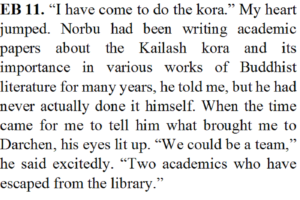

(i) Which of the following activities Norbu had not been doing?
(a) writing about Kailash kora
(b) writing about Buddhist literature
(c) writing about importance of kora
(d) doing the kora himself
(ii) At which town author and Norbu were when above discussion took place”
(a) Hor
(b) Darchen
(c) Ravu
(d) None of the above
(iii) Who are the academicians referred in the above extract?
- Testan
- Daniel
- Norbu
- the author
(a) only 3
(b) only 1
(c) only 2
(d) both 3 and 4
(iv) In the phrase ‘We could be a team’, who are referred as ‘we’?
(a) Daniel and Norbu
(b) Daniel and author
(c) Author and Norbu
(d) Daniel and Tsetan
Which of the following phrases express the eagerness of two people
- my heart jumped
- he told me
- he said excitedly
- his eyes lit up
- we could be a team
- Norbu had been writing academic papers
(a) 1,2 and 4
(b) 1,3,4 and 5
(c) 3,4 and 6
(d) 4,5,6 and 2
Short Answer Questions (30-40 words)


Answer: ‘Drokbas’ are animal rearing people living in Tibetan region. Their profession is rearing of animals and sheep.
When tourists pass them they stare at vehicles and sometimes wave at tourists.


Answer: During first night author faced problem in breathing and his chest became heavy. He became better if he sat up.
Next day Tsetan took him to a doctor. After a course of one day medicine, author had a good sleep and recovered.


Answer: At the village Ravu, a woman Lhamo gave him a sheep skin coat as a farewell gift.
Since the author was going higher up in mountains for his Kailash kora, he certainly needed this warmer coat.


Answer: Author initially wanted to do kora with other pilgrims but there were none. Norbu also wanted to do kora.
He knew English. Norbu suggested to hire yaks for carrying their luggage. These two aspects were suitable to author. So he thought Norbu could be a perfect companion.


Answer: They met snow twice on the road.
On first occasion, they all got down from the car. Tsetan tried to slither and slide snow forward. He stamped on it to assess its strength. He spread fistfuls of sand on snow. He slowly traversed the vehicle through snow. Now Daniel and author got into the vehicle.


Answer: From outside the college looked like a monastery. The consultation room was cold and dark. The doctor did not wear the normal paraphernalia of a doctor. The medicines were wrapped in screw papers.
These were the unusual sights.


Answer: Manasarovar Lake is regarded very holy. Four rivers namely Ganga, Sutlej, Indus and Brahmaputra emanate from this lake. Every year many pilgrims visit this lake.


Answer: Mastiff are huge shaggy dogs found in Tibetan regions. These are normally of black colour and have large jaws. They are ferocious, not afraid of anything and run like a bullet. They chase for hundreds of meters and drive out unknown people / objects.


Answer: Hor was a grim, miserable place. There was no vegetation just dust and rocks. The town had heaps of garbage and refuse was scattered across the town.
The town had only one café that was of old style. It did not have good hygiene.
Author was not happy about this town.
Long Answer questions (120-150 words)


Answer: Author had reached Darchen around 10:30 PM and stayed in a guest house. His one of the nostrils got blocked. He could not breathe properly. Whenever he tried to lie down, his chest became heavy. He felt better when he sat up. Next day Tsetan took him to a doctor. After a course of medicine for complete day, he became better and had nice sleep.
Author did not want to go alone for kora. Other pilgrims had not yet arrived, So he stayed at Darchen. He used to often go to the only café at Darchen to have tea, food and read books there.
One afternoon Norbu entered café and requested author’s permission to sit at his table. Soon they struck conversation. Author understood that Norbu was an academician and wanted to do kora. Norbu suggested to hire yaks to carry their luggage. These aspects suited author and he decided to complete his kora with Norbu as a companion.


Answer: One normally decides his / her pilgrimage or visit to places based on the description provided by earlier visitors. Sometimes this description is also provided by those agencies who promote tourism in that area.
Description provided by promoting agencies is to lure visitors. Hence it tends to be that available under most favourable situations. Realty many times is not at its best.
There is a time lag between earlier descriptions and the present time. Many things change with time. Environmental conditions may not be identical over a period of time.
Also, the emotional quotient and perception of a person varies to a great extent from that of any other person. What is good for a person could be a trivial for another person.
Owing to above reasons reality of some places is often different from the earlier descriptions.


Answer: Author has narrated his pilgrimage from a place called Ravu. He was given a warm cloth by Lhamo. His guide Testan and another person Daniel started in jeep for their onward journey.
They drove through rolling hills of Ravu. They saw herd of kyang. They saw animal rearing nomadic families. These family used to keep ferocious mastiff dogs as pets.
They gradually gained height driving through meandering, rough and bumpy roads. Twice they had to remove snow from road. The stopped at a petrol tank to take petrol for their four wheel drive jeep. The author started feeling headache due to gaining height. In the afternoon they reached a town called Hor. Daniel separated from them. Author describes Hor as a miserable grim town.
Around 10:30 PM they reached Darchen. Whole night author could not sleep. He had some problem in breathing and a strange feeling in his chest. Next morning Testan took author to hospital. The doctor gave him five day course of Tibetan medicines. Author felt much better next day. After that Testan returned.
Author describes Darchen as unhurried and relaxed town. But there were no pilgrims. After couple of days he met a person Norbu who too wanted to do Kora. They decided to form a team and complete Kora.
***
FATHER TO SON
Extra Questions
Extract Based Questions
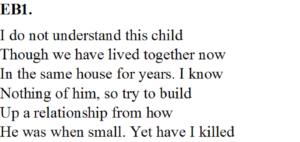

(i) Who is poet of the above extract?
(ii) What is the poetic device in the second line of the extract?
(iii) How are ‘I’ and ‘child’ related to each other?
(iv) Why the poet wants understand the child?
(v) Where have the poet and the child living?
(iv) Which word in the extract is antonym of ‘destroy’
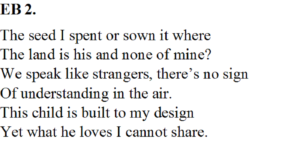

(i) Which line of the extract mean father tried to pass on his thoughts to his son?
(ii) What line of the extract indicate that son did not accept what was taught to him?
(iii) Which line mean that the son has physical resemblance to his father?
(iv) Which word in the extract is antonym of ‘friends’?
(v) Which poetic device is used in third line of the extract?
(vi) Which poetic device is used in fifth line of the extract?
(vii) Which poetic device is used in second line of the extract?
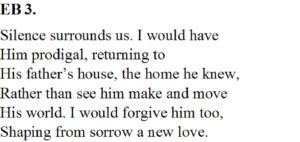

(i) Which word in the extract mean ‘one who spends too much?
(ii) Which word in the extract is synonym of ‘pardon’?
(iii) Are father and son talking to each other often?
(iv) What does father want his son to do?
(v) What does forgiving the child may lead to?
(vi) Which poetic device is used in third line of the extract?
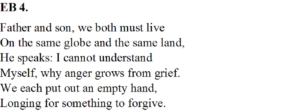

(i) Which two poetic devices have been used in the second line?
(ii) What is the cause father and son not living together?
(iii) What does the phrase ‘empty hand’ mean?
(iv) Which word in the extract mean ‘a strong desire’?
(v) Which poetic devise has been used in the fifth line?
(vi) Which word in the extract is synonym of ‘sorrow’?
Short Answer Questions (30-40 words)


Answer: Father and son have been living in the same house. But there is lack of communication between them. Father feels that they are emotionally far away. He fears that his son may soon go away from the house to live separately.


Answer: Father is ready to accept habit of his son to spend more money. Father is ready to unconditionally forgive his son. He is ready to accept his preference and compromise his own choices.


Answer: Father desires better communication with his son, He wants that they both should share feelings with each other. He is ready to make compromises with himself and welcome his son without any conditions. He wants his son to live with him.


Answer: They have a different perspective towards life. Their habits particularly about spending is different. They did not try to understand feelings of each other hence they stopped communicating.
Thus they know little about each other.


Answer: Father did not understand the aspirations of his son. The son did not understand the feelings and emotions of his father. They stopped expressing themselves. Thus they stayed like stranger in the same house.


Answer: Father and son have been living in the same house. But they do not appreciate outlook of each other. Therefore they seldom talk to each other which has created communication gap between them. The poet has termed this situation as ‘silence surrounds us’.
Long Answer Questions (100-150 words)


Answer: I would like to answer this question from the perspective of a student of class 11.
By this stage we have many friends. We like to play together, talk a lot and discuss many aspects of life. We start forming our own thought process.
We talk to our parents to seek their inputs to refine our understanding. But parent instead of adding value, start proving us wrong. When it happens on every occasion, we do not feel like talking to them.
These days we have easy access TV serials and social media. Our awareness thus is more than that of our parents when they were kids. It is hurting their ego. They try to bully us. When it becomes daily routine, we try to hide things from them. This further widens the communication gap.
We understand that communication gap is causing harm to society. We want to be closer to our parents. But our parents also need to show some sensitivity to us. Let them understand us and we will continue to respect them.
****


0 Comments